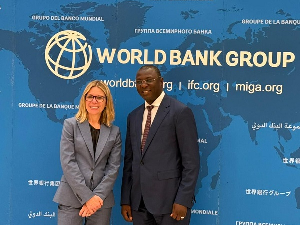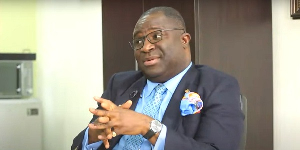Finance Minister, Dr. Mohammed Amin Adam, has underscored the transformative potential of intra-African trade in fostering economic growth, job creation, and poverty reduction across the continent.
His remarks, delivered at the World Bank African Caucus Meeting in Washington DC on October 22, 2024, come at a time when Africa is seeking new avenues for economic revitalization in the wake of global economic challenges.
Speaking at the meeting chaired by World Bank President Ajay Banga, Dr. Amin Adam emphasized the critical role that trade among African nations will play in unlocking economic opportunities.
“We recognize intra-African trade as a catalyst for economic growth, job creation, and poverty reduction,” Dr. Amin Adam noted.
“African governments are committed to surmounting all impediments to intra-African trade with the invaluable support of the World Bank and the IMF.”
The Finance Minister outlined a vision for a more interconnected and inclusive African market, highlighting that one of the main imperatives for boosting trade across the continent is the establishment of an effective and unified intra-continental payment system.
According to him, such a system is vital to ensuring seamless transactions across borders and leveraging the full benefits of the African Continental Free Trade Area (AfCFTA).
“We’ve identified an effective and unified intra-continental payment system as one of the imperatives for intra-African trade. Financial inclusion and harmonized trade rules are necessary to ensure an inclusive AfCFTA implementation, leaving no country or individual behind,” Dr. Amin Adam stated.
Central to the Minister’s remarks was the need for Africa to adopt modern, scalable financial technologies to facilitate cross-border transactions.
He called on the World Bank and other international partners to prioritize investments in ICT infrastructure across the continent to support the development of the Pan-African Payment and Settlement System (PAPSS).
This system, he said is designed to enable instant payments across African countries in local currencies, and is seen as a game-changer for intra-African trade.
He said technologies such as blockchain, artificial intelligence, and digital information grids will be essential in enabling universal access to digital financial services for all Africans.
“These technologies are critical to bridging the digital divide and ensuring that all Africans, especially those in underserved areas, can participate in the continent’s economic transformation,” he added.
The Finance Minister also expressed confidence in the World Bank’s evolving approach to supporting Africa’s digital transformation.
He pointed to the Bank’s new “digital as a vertical” playbook as a promising framework for expanding the digital financial ecosystem across Africa.
In addition to building infrastructure, Dr. Amin Adam highlighted the need for the strategic deployment of financial tools, such as guaranteed and blended finance mechanisms, to attract private capital for expanding the continent’s payment systems.
This, he argued, would help reduce the cost of cross-border transactions and make financial services more accessible to Africa’s growing population. He also stressed the importance of enhanced cybersecurity measures to protect the integrity of payment systems.
He concluded by urging the World Bank and its African stakeholders to engage closely with regional financial intermediaries to analyze and address gaps in the existing continental payment systems.
“We urge the Bank to engage with our regional financial intermediaries to analyze the gaps in the continental payment systems and propose a roadmap for the integration of continental payment systems and policies,” he said.
The Finance Minister is leading Ghana’s delegation to the Annual Meetings of the IMF and the World Bank, currently happening in Washington D.C. In a series of meetings held so far, he has underscored the need for trade harmonization, climate financing, and policies that will promote inclusive growth in Africa.
Business News of Thursday, 24 October 2024
Source: thebftonline.com

















